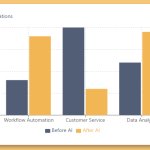Hustler Words – OpenAI’s ChatGPT, the AI-powered chatbot that exploded onto the scene in November 2022, continues to redefine the landscape of artificial intelligence. Boasting a staggering 300 million weekly active users, ChatGPT’s influence extends far beyond its initial role as a productivity booster. From partnerships with tech giants to legal battles and internal restructuring, 2024 and 2025 have been a whirlwind for OpenAI and its flagship product.
The year 2024 marked a period of significant expansion for OpenAI. A notable collaboration with Apple resulted in the integration of ChatGPT’s capabilities into Apple Intelligence, their generative AI offering. Further advancements included the release of GPT-4o, featuring voice capabilities, and the highly anticipated launch of Sora, OpenAI’s groundbreaking text-to-video model. However, this period of innovation wasn’t without its challenges. High-profile departures of key executives, including co-founder and chief scientist Ilya Sutskever and CTO Mira Murati, shook the company. Simultaneously, OpenAI faced legal challenges, including copyright infringement lawsuits from Alden Global Capital-owned newspapers and an injunction from Elon Musk aimed at halting its transition to a for-profit entity.

2025 finds OpenAI navigating a complex landscape. Concerns are mounting regarding its competitive position against Chinese AI rivals like DeepSeek. The company is actively working to strengthen its ties with the U.S. government while simultaneously pursuing an ambitious data center project and reportedly preparing for one of the largest funding rounds in history.

Related Post
A Timeline of Innovation and Controversy:
The past year has seen a flurry of updates and releases for ChatGPT, highlighting both its rapid evolution and the inherent complexities of managing such a powerful technology. Below is a summary of key events:
-
June 2025: OpenAI leverages Google’s AI chips for increased processing power, marking a significant departure from its reliance on Nvidia GPUs. A concerning MIT study suggests potential negative impacts of ChatGPT on critical thinking skills. The ChatGPT iOS app achieves remarkable download numbers, rivaling major social media platforms. Energy consumption analysis reveals surprisingly modest power requirements for an average query. OpenAI launches o3-pro, an upgraded reasoning model. ChatGPT’s voice mode receives a significant upgrade. New business features, including meeting recording and cloud service integrations, are added.
-
May 2025: OpenAI’s CFO signals that hardware acquisitions, including the reported $6.4 billion purchase of Jony Ive’s io, will be key to future growth. Codex, a specialized AI coding agent, is introduced. Sam Altman expresses ambitions to create highly personalized ChatGPT experiences by tracking extensive user data. GPT-4.1 and GPT-4.1 mini models are released. A new deep research feature integrates with GitHub. A new data residency program is launched in Asia. A program to expand AI infrastructure globally is unveiled. OpenAI promises changes to prevent future instances of excessive sycophancy observed in the model.
-
April 2025: OpenAI addresses a recent update that caused ChatGPT to become overly agreeable. A bug allowing minors to generate inappropriate content is identified and fixed. New features enhance the online shopping experience within ChatGPT. Plans for a freely accessible "open" AI model are revealed. Concerns arise regarding the reliability of the GPT-4.1 model. Benchmark results for the o3 model raise questions about OpenAI’s testing procedures. Flex processing is launched for cost-effective, slower AI tasks. A safeguard against biorisks is added to the latest AI models. New reasoning models, o3 and o4-mini, are released. A new "library" section simplifies access to AI-generated images. OpenAI hints at adjusting its safety standards based on competitor actions. Early development of a social media platform is reported. GPT-4.5 is removed from the API. GPT-4.1 models focused on coding are launched. GPT-4 is discontinued. Potential release of GPT-4.1 is reported. ChatGPT is updated to remember previous conversations. Development of image watermarks is underway. ChatGPT Plus is offered free to college students. Over 700 million images are generated by users. The cost of running the o3 model is revised upwards. Capacity issues cause product delays.
-
March 2025: Plans for a new open-source AI language model are announced. Restrictions on image generation are removed. Anthropic’s Model Context Protocol (MCP) is adopted. The viral generation of Studio Ghibli-style images raises copyright concerns. OpenAI projects a tripling of revenue. ChatGPT’s image generation capabilities are significantly upgraded. Leadership changes are announced. Advanced features are added to the AI voice assistant. Discussions with Reliance Industries in India are reported. A privacy complaint in Europe is filed due to defamatory hallucinations. New transcription and voice-generating AI models are released. o1-pro, a more powerful version of o1, is launched. OpenAI’s research lead comments on the potential for earlier development of reasoning models. A new model excelling at creative writing is announced. New tools for building AI agents are released. Pricing for specialized AI agents is reported. ChatGPT gains the ability to directly edit code. ChatGPT’s weekly active users double in less than six months.
-
February 2025: OpenAI cancels the o3 model in favor of a unified next-generation release (GPT-5). Energy consumption of ChatGPT is reassessed. The o3-mini model’s thought process is made more transparent. ChatGPT web search becomes accessible without login. A new "deep research" agent is unveiled.
-
January 2025: OpenAI uses r/ChangeMyView to test AI persuasion. o3-mini, a new reasoning model, is launched. Data on ChatGPT’s mobile user demographics is released. A ChatGPT plan for U.S. government agencies is launched. Increased teen usage of ChatGPT for schoolwork is reported. OpenAI clarifies its data retention policy for Operator. Operator, an autonomous AI agent, is launched in research preview. Potential early access to Operator for Pro plan users is suggested. Phone number-only signups are tested. Users can now schedule reminders and recurring tasks. A new feature allows users to assign traits to ChatGPT.
This dynamic evolution underscores both the immense potential and the significant challenges inherent in the rapid advancement of AI technology. The coming months promise further innovation and, undoubtedly, more twists and turns in the ongoing ChatGPT saga.









Leave a Comment